- Home
- Donald McCaig
Jacob's Ladder: A Story of Virginia During the War Page 3
Jacob's Ladder: A Story of Virginia During the War Read online
Page 3
Stratford’s wheat, sawn planks, and railroad sleepers traveled by wagon south to Millboro Springs, where the western ambitions of the Virginia Central Railroad had been checked by the impassable mountains.
Excepting the few weeks in winter when the race froze, the creak of that tall mill wheel and the growl of millstones were the living breath of Stratford Plantation. Day started when Jack the Driver opened the floodgate and stopped when he dropped the heavy gate into its slots again.
Forge, granaries, corn cribs, fowl house, and dairy clustered near the mill. Next came two great barns, each bulging with feed. Between the barns and the great house were the Quarters, a narrow street lined with one-room log cabins, each with its own wattle-and-daub chimney, each with a garden plot behind. The house and its dependencies stood on a low rise, facing south.
Meathouse, root cellar, and kitchen were behind the plantation house. The kitchen house was connected to the main house by a covered passageway—the “hyphen.”
Twenty-eight colored servants lived at Stratford. Children and elderly milked the cows, made the cheese, slopped the hogs, gathered eggs, killed and plucked chickens, and tended the kitchen garden. One very ancient servant, Agamemnon, had no assigned tasks, though he sometimes made up potions and salves. Middle-aged men and women worked the fields, and two gangs of timber cutters—“Rufus’s gang” and “the old gang”—lived in the woods, visited weekly by Jack the Driver. House servants included Pompey, the houseman, a scullery girl, the cook, and Miss Abigail’s personal servant, Midge, who looked out the window and shivered. “There’s Master Duncan ridin’ out. I expect he’s goin’ out to warn the woods gangs.”
Miss Abigail clipped a pattern from Godey’s Lady’s Book. “If you wish to improve your speech, dear, you mustn’t drop your ’g’s.”
Midge flushed. “Yes ma’am. I forget myself.”
“Modest and pleasant speech always produce a favorable impression. Midge, I feel a headache coming on. If you fetch a cool cloth, I shall lie back and you shall read to me. When you encounter a novel word, spell it for me.”
Midge took up the lady’s magazine reluctantly. Speaking correctly was easier than reading. She had a knack for imitating speech, and last Christmas when Cousin Molly visited, Midge soon had Cousin’s Molly’s Tidewater drawl duplicated perfectly. The snow pelted the bedroom windows of Stratford House as the young Midge read aloud an account of a fancy dress ball in London, which, Godey’s noted, Prince Albert had attended. A draft brushed the crystal pendants dangling from the lamps, and light sparkles danced across the veneered mahogany wardrobe and the settees commodious enough to seat three males shoulder to shoulder or one lady in hoops. Several treasured articles—Miss Abigail’s dressing case, a hat box—rested on the stairs to the nursery on the second floor. These stairs were three-quarter-size, the latticework balustrades too close for a child to slip through. No child had used them since Duncan.
Abigail’s husband, Samuel, slept in his spartan office. Every morning, Abigail Gatewood dressed carefully before passing through the parlor and across the hall to the dining room, where Pompey had her breakfast.
“Master Gatewood already out?” she’d ask, surprised. Though he invariably was, Miss Abigail was always surprised.
The afternoon of the snow, Samuel Gatewood was at his mill.
“Comin’ down hard, Master Samuel,” Jack the Driver said.
“The last time a January storm came from the east was in ’35—the year before my father died. I don’t care for it. Send boys up the mountain after the hogs. Toll them in with corn. We’ll want the big barn prepared to receive the milk cows and horses. See to the partitions. We’ll feed more than customary ration tonight. Send Franky through the Quarters. She must ensure all have sufficient meat, cornmeal, and beans. Many woodboxes are nearly empty. Set some hands to the slabwood pile—it may not burn long, but it burns hot. After the firewood is cut, close the millrace—I misdoubt we’ll be milling tomorrow. If this storm is less severe than it appears to be, our precautions will appear foolish, but . . .”
“Master Samuel, look yonder. Cows all lying down. Critters know better’n we do what’s coming.”
The Botkin plantation was ready before its downriver neighbor, but doubtless that was because there was less to ready. By four o’clock, when falling snow was precipitating the night, Opal, Jesse, Sallie, and Uther were seated at the pine table with their hot cocoa and a stew warmed by the fire. There was a chicken in it, and potatoes and carrots, and it smelled rather wonderful, but that may have been due to their exertions and the snugness induced by wild weather outside their plank door.
At Stratford, in the last minutes before darkness was complete, Jack said, “Master Samuel, if you don’t leave for the big house this minute, I believe you’ll spend the night with me.”
The lantern in Stratford House’s parlor window blinked through the blizzard. Samuel Gatewood trudged home through foot-deep snow, aware, suddenly, how weary he was.
Although Rufus had offered a bed in the woods cabin and begged him to stay, young Duncan hadn’t. Emergencies pleasure young men, and at four o’clock, just as the Botkins were settling in, Duncan turned Gypsy’s head back down the mountain. In the hollows and the west-facing ridges the horse could still find good footing and Duncan’s eyes were young and sharp, and it wasn’t until they reached the wheat bottom that Duncan lost track of everything. His hair was frozen, his eyelashes stuck to his face, the thick reins stiffened in his hands. Gypsy shifted her feet. Duncan’s heart jumped and he could not seem to catch his breath. He waited until panic subsided before saying, in almost his normal voice, “Well, girl, I hope you know the way because I surely do not.” He loosed the reins, gave Gypsy her head, and clucked. The horse stayed still for a moment before turning her head sharply left and proceeding. When she stopped of her own accord, Duncan dismounted to open the gate; a gate Duncan prayed opened into the lower barn pasture. When Gypsy stopped again, Duncan could see no better, but he heard animals inside the barn chewing and belching. A horse nickered, and Gypsy nickered back.
When Duncan slid the door open, a single lantern glowed outside the tack room. Insulated by the hay floor overhead and heated by a dozen horses and as many milk cows, the barn was yeasty, a little moist, and warm enough that he couldn’t see his breath. Duncan led Gypsy down the aisle to an empty stall and found rags to rub her down. When Duncan had Gypsy dry, fed, and watered, he leaned against the stall door, his knees shaking.
“Bet you wish you hadn’t been so bold,” a girl’s voice said.
“Who the devil . . . ?”
The colored girl was in the manger above the stalls, among tomorrow’s hay, her feet dangling. “I ain’t no devil,” she said.
“It was you lit the lantern!”
She turned and hang-dropped into the aisle. Rubbed her hands clean. “Weren’t no cow lit it. Dark in this old barn. Rats and bats and goodness knows what-all else.”
“Midge, why aren’t you in the house?”
She put her hands on her hips, a skinny child with lank black hair, all long bones and elbows and taut skin. “Because your mama was afeared for you and ask me go to the barn and see is you back but you ain’t so here I waits and when I sets to leave I can’t see three feet through that snow, nary three feet. I don’t want be in no smelly barn I want to be in the kitchen house in my warm bed.”
“That’s where you sleep?”
“My bed next the chimney. Sometimes cook says she might take my bed. Reckon she’ll have it tonight. You get any supper?”
Duncan wiped moisture off his face. “No.”
“Me neither. They be eatin’ in the kitchen house, Jack and cook and that old conjure man, Uncle Agamemnon, all of them. Cut up possum this mornin’. Be potatoes and carrots and cook’s got a big onion . . .”
“Will you hush? Why talk about what we aren’t about to have.”
“Not much else a colored girl can talk about. Want to talk about the River Jordan or
gettin’ to the Promised Land? I was readin’ Mistress Abigail about some fancy ball in London, maybe you like me talk ’bout that?”
“I didn’t know you could read.”
“Lot you don’t know, young Master Duncan.”
He was clumsy and tongue-tied and didn’t want to look into her flashing eyes, so he turned to give Gypsy a pat. “She found the way home. Even when I couldn’t see a darn—damn—thing, Gypsy found the way. Aren’t horses amazing?”
The girl nodded solemnly, “Oh yes, Master Duncan, you right there: horses mighty amazin’.” In a voice that sounded remarkably like his mother’s, Midge said, “I cannot begin to name the amazements provided by our magnificent horses.”
A shiver went down Duncan’s spine. “Where’d you learn to do that?”
She shrugged. “That Franky say I’ze witchy,” and she rolled her eyes.
Duncan went to the barn door and pressed his ear against the wood. “Still howling,” he pronounced. “No telling how long this will continue.”
“We be hungry. Maybe you kill a cow?” She had her head cocked slightly and her eyes wouldn’t stop flashing.
“We won’t get that hungry,” the boy said scornfully.
“You sayin’ that ’cause you can’t do it,” she said. “Here we be in this ratty barn with no food and snow blowin’ all around and lots to eat—” this time in Cousin Molly’s cool Tidewater drawl—“were there merely a gentleman to provide it.”
“I don’t like you doin’ that,” he said.
“I don’t care what you like.”
The moment came for Duncan to rebuke his servant, but Gypsy arched her tail and passed manure and it fell plop plop to the floor and the two giggled. “Whew,” Midge said, “What you feedin’ that horse!”
“Rose petals,” Duncan said, and they giggled again.
When they ran out of giggles, tension returned, but it was a different tension: friendlier.
“You got no more clothes than that?” Duncan asked.
Outside her short-sleeved cotton shift the girl’s arms were goose-pimpled.
For reply, the girl sneezed. “Duncan . . . —I” She sneezed again.
He fumbled along the stall partition for a dry horse rag, into which she snuffled. She threw it down. “Now I don’t smell no better than that horse,” she wailed, and Duncan was rendered helpless by her tears. “Account of you, I’m cold and I’m hungry and now my face stink like horse sweat. You got any more notions, young Master?”
Duncan took a sudden dislike to a title he’d heard all his life. “Don’t call me that,” he said.
She judged him with her eyes, valuing him as if he were on the auction block. At last she said, “You got any more of them rose petals?”
Their smiles were remarkably like.
In the tack room they found a chunk of cheese meant for the rat traps, but Midge wrinkled her nose. When she wrinkled her nose, her entire face became her wrinkled nose: nothing halfhearted.
Duncan forked straw into an empty stall and laid a horse blanket atop. A torn gray-green buggy robe served for a coverlet. “You’ll be warm here,” he said.
She took off her shoes and wiggled her toes. She said, “It’s a mighty big stall. Might be room for two.”
That night Duncan slept curled against a girl so light he dreamed she was slipping through his fingers.
In the morning, a curious gray light filtered through the barn walls, but out of doors was a howling white wilderness. They spoke a few words, but not many, because words would have led them where neither was ready to go. They fed and watered the animals and twice milked all the cows, and excepting what warm milk they drank, emptied their buckets out in the snow.
By next morning, Cox’s snow had deposited seventy inches of snow on Stratford Planation, seven and eight feet where it drifted. Jack and a gang dug a path from the Quarters to the main house before digging to the barn, where they hoped to find Miss Abigail’s young servant.
The big double doors were drifted shut, so men boosted Jack in through the loft door. On hands and knees Jack said, “That you there, Master Duncan? Praise the Lord! We powerful feared for you!”
When little Midge stepped out from behind Duncan, Jack fell dumb.
JOHN BROWN’S BODY
CHARLES TOWN, VIRGINIA
DECEMBER 2, 1859
AS IT HAPPENED, nearly two years later Cadet Duncan Gatewood guarded John Brown’s gallows the night before Brown’s execution. Hoarfrost diamonded the dead grass, frost whitewashed the planks of the gallows floor, and Duncan wondered what they’d do with the lumber after this machine had satisfied its purpose and been disassembled. Although the planks were clear yellow pine, the milling was imprecise. Duncan was Jack the Driver’s principal assistant at Stratford’s sawmill, and in the young man’s critical judgment, these boards were barely suitable for rough siding.
Picket fires blinked on the Blue Ridge, and from time to time Duncan heard faint challenges from the ford where Captain Ashby’s cavalry was stationed. The dome of the Charles Town courthouse glowed in the moonlight. That’s where they’d condemned him. The jail across the street—that’s where they’d imprisoned him. That light in the second story window—it was his light.
Mr. Poe was Duncan Gatewood’s favorite poet, and he loved Walter Scott’s romances, and he believed that this ordinary grassy meadow at the edge of this village was kin to other blood-haunted places where men had done bold deeds. He hoped Charles Town might enter the noble list that included Hastings, Agincourt, Vera Cruz, and Crécy. Duncan was not deluded by his own part in this, a part he correctly deemed slight: second watch at a gallows guarded by two thousand Virginia troops who’d swiftly waylay any abolitionists intent on mischief. If Duncan’s post had been important, an older cadet, an upperclassman, would have filled it.
In the grandeur of the moment, he made a pledge to his lover. “I pledge you,” he prayed. “My sacred honor.” Sixteen-year-old Duncan Gatewood couldn’t pledge anything less precious. He owned only his horse and clothing. Prospects of one day becoming master at Stratford had dimmed when a furious Samuel Gatewood learned of their affair. Duncan ached to give Midge something, and honor was all he had to give.
Back at the Institute he often put himself to sleep remembering their lovemaking. The gentle underslope of her small breasts, the way she stood splayfooted when she was naked. Her elbows, she had solemnly assured him, were too big. And so he kissed each elbow and one thing led to another.
“You fancy.” Midge had laid her smooth wrist against his cheek. “You my fancy man.”
A gaunt figure startled Duncan from reverie. “Halt! Stand still a minute till I get a look at you!”
It—he—was a cadet. Well . . . almost. A charade of a cadet; his gray overcoat broomed the dirt, his dashing, braided kepi perched on streaky-gray hair. As if a cadet had moldered overnight, a Rip Van Winkle cadet who’d awakened after twenty years.
Duncan drew back his musket’s hammer. “If you don’t quit coming, I’ll put a ball through your gut.”
“Sic Semper Tyrannis, son. That’s the countersign, and had you proffered the proper challenge, I’d have returned it to you. Please set aside that blunderbuss before you do something that’ll leave Mrs. Ruffin grieving.”
The oldster’s sliding steps kept his greatcoat off his heels.
“You’re no Institute cadet. What’re you doing wearin’ our uniform?”
“Craved to be a soldier since I was a lad digging mud forts in the flats of the James. Son, I told you about that musket! Colonel Preston himself located this proud uniform. A cadet captain had forethought to bring a spare. Pay no heed to his badges of rank. I am an honorary cadet private, nothing grander.”
“Yes, sir. But since you haven’t any business here, I’ll ask you to repair to the bivouac.”
Ruffin flapped both arms like a disturbed hawk pumping for altitude. “Son, I am come here to see and see I shall.”
If Duncan raised the alarm, there�
�d be soldiers here on the instant, displeased to be so summoned. “Your word of honor then,” Duncan said. “Your word of honor you are not an abolitionist.”
The old man had muttonchop whiskers, flat cheeks, a tiny sharp nose, but when he grinned he opened a frog’s mouth from jawhinge to jawhinge. His teeth perched on the red ridges of his gums like coracles on a wave. “I’ve been accused of many sins, but of that particular wickedness I am innocent as this moonlight here. I am Edmund Ruffin.”
“I know no Ruffins. No Ruffins in my home county.”
“Your father—is he a planter?”
“We thresh some wheat. Cattle. Been a good year for cattle. I been sent away from home since spring. To the Virginia Military Institute.”
“Does he subscribe to the Farmer’s Register?”
From the way the man spoke, Duncan surmised that Edmund Ruffin and the Farmer’s Register were one and the same.
“No, sir,” he said.
“Does your father manure?” Ruffin flipped his coat and set his hands on his hips. Cadet Spaulding’s trousers yawned at his waist. “Calcareous manures, sir: marl, plaster, carbonate of lime. Does your father marl his fields?” The old man shook his head. “Sometimes I despair for agriculture in the Commonwealth.”
The moon slid behind a cloud and blackness chased across the commons, and Ruffin clutched his coat about him. Nodding at the solitary light in the jail’s second-story window, he said, “He’ll be busy this night, I’d venture.”
“I hear he does right smart of praying.”
The old man’s grin yawned like a trap. “There’s not hours enough left to him to undo the damnation he has merited.”
“Sergeant Colley—Colley’s with the regulars—says he’s all the time writing letters.”
The moonlight washed so strongly it dimmed the picket fires on the Blue Ridge. “I suppose,” Ruffin said, “we are fortunate to have had him.”
“Sir?”
“Clarity, son. Brown has provided clarity. Have you inspected the pikes he intended to distribute to our servants that they might employ them upon our sleeping wives and children? Pikes eight feet in length with a double-edged spearhead honed and stropped keen as your razor.”

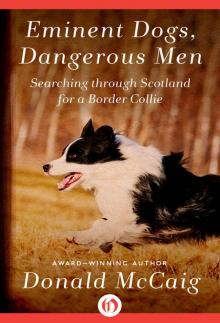 Eminent Dogs, Dangerous Men: Searching Through Scotland for a Border Collie
Eminent Dogs, Dangerous Men: Searching Through Scotland for a Border Collie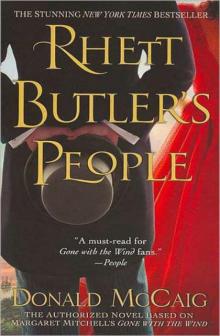 Rhett Butler's People
Rhett Butler's People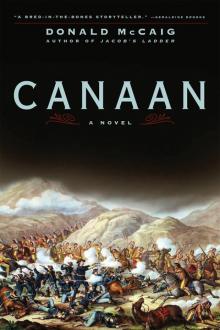 Canaan
Canaan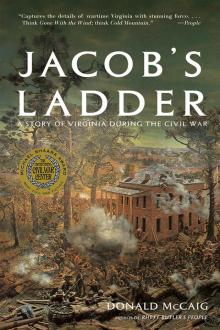 Jacob's Ladder: A Story of Virginia During the War
Jacob's Ladder: A Story of Virginia During the War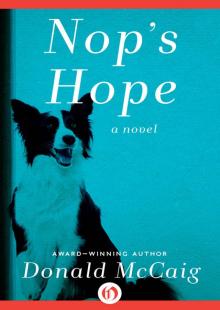 Nop's Hope
Nop's Hope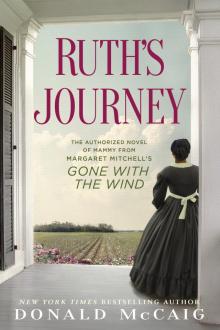 Ruth's Journey: The Authorized Novel of Mammy From Margaret Mitchell's Gone With the Wind
Ruth's Journey: The Authorized Novel of Mammy From Margaret Mitchell's Gone With the Wind Nop's Trials
Nop's Trials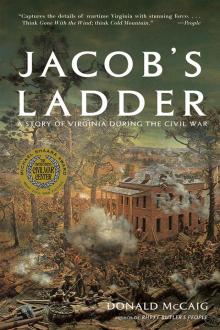 Jacob's Ladder
Jacob's Ladder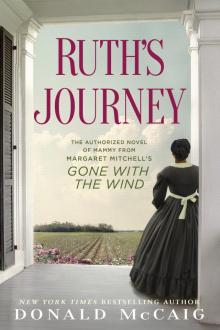 Ruth’s Journey
Ruth’s Journey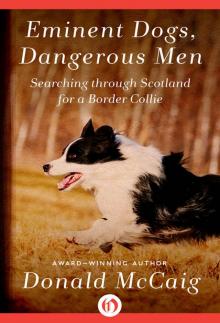 Eminent Dogs, Dangerous Men
Eminent Dogs, Dangerous Men